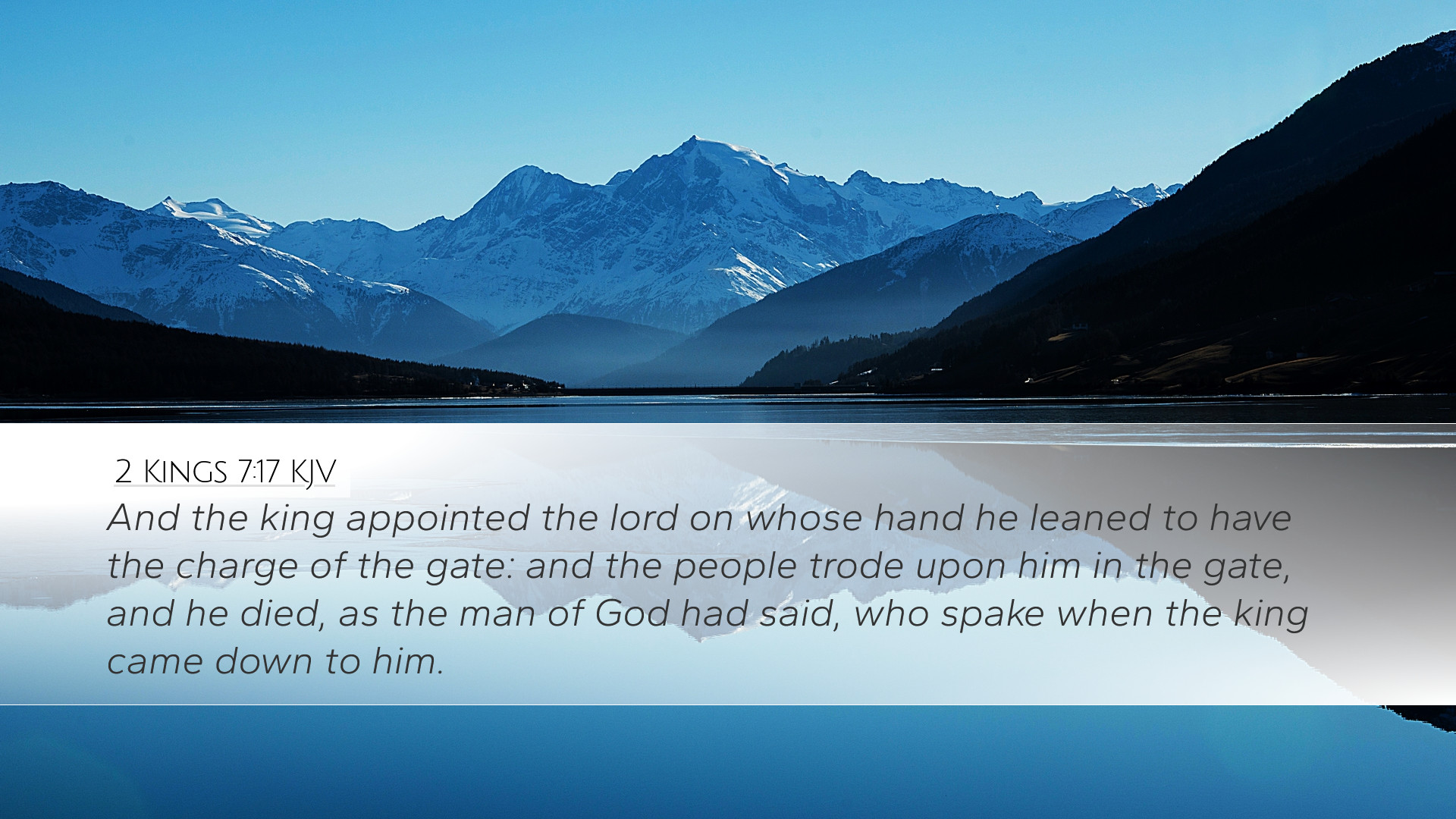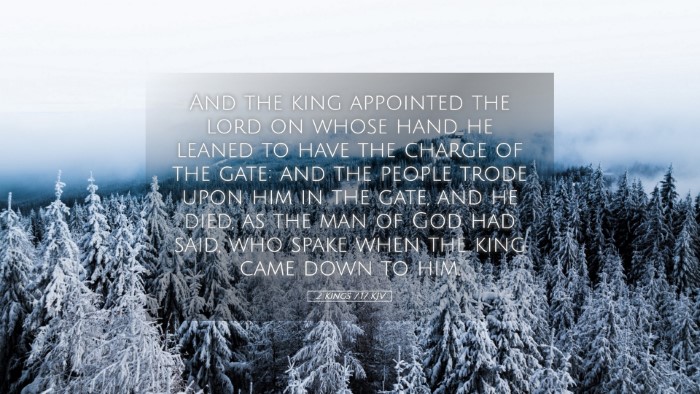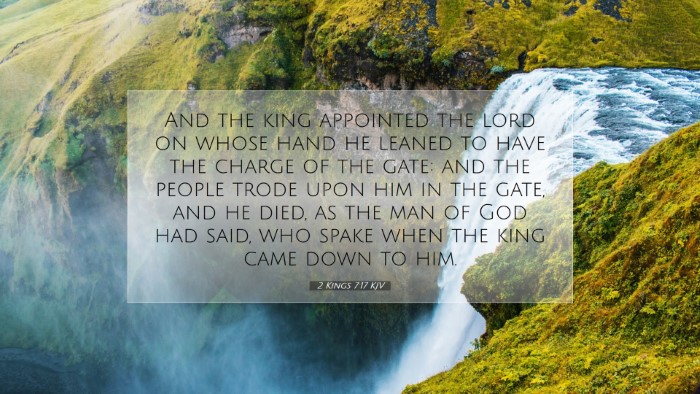Old Testament
Genesis Exodus Leviticus Numbers Deuteronomy Joshua Judges Ruth 1 Samuel 2 Samuel 1 Kings 2 Kings 1 Chronicles 2 Chronicles Ezra Nehemiah Esther Job Psalms Proverbs Ecclesiastes Song of Solomon Isaiah Jeremiah Lamentations Ezekiel Daniel Hosea Joel Amos Obadiah Jonah Micah Nahum Habakkuk Zephaniah Haggai Zechariah Malachi2 Kings 7:17
2 Kings 7:17 KJV
And the king appointed the lord on whose hand he leaned to have the charge of the gate: and the people trode upon him in the gate, and he died, as the man of God had said, who spake when the king came down to him.
2 Kings 7:17 Bible Commentary
Commentary on 2 Kings 7:17
Verse Context: "And the king appointed the lord on whose hand he leaned to have the charge of the gate: and the people trode upon him in the gate; and he died, as the man of God had said, who spake when the king came down to him." (2 Kings 7:17 KJV)
Introduction
This passage from 2 Kings encapsulates a pivotal moment during a siege in Samaria, marked by prophetic fulfillment and dramatic events. It serves as a profound example of divine sovereignty versus human skepticism. The insights drawn from the commentaries of Matthew Henry, Albert Barnes, and Adam Clarke offer a deeper understanding of the spiritual and historical significance of this verse.
Understanding the Historical Background
The backdrop of this chapter is critical to interpreting the events described. The city of Samaria was besieged by the Arameans, which caused severe famine. The situation was dire, with starvation leading to desperate and tragic decisions among the people (2 Kings 6:25). In the midst of this crisis, the Prophet Elisha declares a sudden reversal of fortunes, proclaiming that within a day, provisions would abound in the city (2 Kings 7:1).
The King and His Officer
In 2 Kings 7:17, we see the king appointing an officer whom he trusted to oversee the distribution of food at the city gate—the gate being a critical symbol of authority and access. Matthew Henry reflects on the king's reliance on this officer as an indication of the king's despair and dependence on human wisdom, despite the prophetic word he received.
- Human Leadership and its Limitations: The king's reliance on his officer serves as an insight into human leadership's failures when it lacks faith in God's promises. The officer's skeptical response to Elisha's prophecy results in his tragic fate.
- The Symbolism of the Gate: The gate often represents the threshold between despair and hope, safety and danger. The officer's role at the gate signifies not only authority over entry and exit but also symbolizes the spiritual choices confronting the people of Samaria.
The Fulfillment of Prophecy
Elisha's word through God's revelation indicated that abundance was on the way. Adam Clarke emphasizes that fulfilled prophecy was not merely about the physical provision but also a testament to God's faithfulness and truthfulness amidst human doubt.
- The Consequence of Doubt: The officer’s skepticism about Elisha's prophecy ultimately led to his demise, showcasing a somber principle that disbelief can lead to self-destruction.
- God's Sovereignty: This event illustrates God’s sovereignty in historical events. The fulfillment of Elisha's prophecy, even in the face of rampant skepticism, reinforces God's control over nations and their leaders.
The People's Response
The latter part of the verse mentions that the people “trode upon him in the gate.” Barnes notes that this can be understood as the people's overwhelming response to the long-awaited provisions. The change from despair to hope is vividly reflected in their actions.
- Desperation to Abundance: The transition from famine to plenty witnessed by the people signifies that trusting in God's word can lead to unexpected deliverance.
- Crowd Dynamics: The chaotic trampling of the officer serves as a physical representation of societal emotions—how despair can turn to jubilation rapidly, but also how the consequences of doubt can manifest tragically.
Theological Implications
This passage raises significant theological discussions regarding faith, prophecy, and the nature of God’s promises. It illustrates how human perspectives often clash with divine assurances.
- Faith vs. Skepticism: The narrative contrasts the faithfulness of God with human skepticism. This serves as a profound lesson for believers, especially leaders, on the importance of trust in God's promises.
- The Role of Prophets: Elisha's role as a prophet underscores God's method of communicating His plans and instructions to His people, reminding readers of the crucial role of divine revelation in understanding God's will.
Conclusion
2 Kings 7:17 stands as a poignant reminder of God's power to deliver even when situations seem hopeless. Through the lens of historical context, prophetic fulfillment, and the human condition, this verse invites pastors, theologians, and scholars to reflect on the nature of faith in the face of adversity. The tragic end of the officer serves as a solemn warning to all who would dismiss divine revelations in favor of human reasoning.


